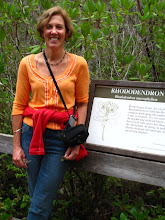This past Sunday, Mom sat in her wheelchair in the sun wearing a straw hat and a green shawl, fastened with an art deco pin, jaunty and dignified. The great-grandchildren - The Greats - grasped baskets and searched for dozens of luminous eggs which I, wearing white furry rabbit ears as the Easter Bunny's helper, had hidden in plain sight.
"I might look near the stairs..." I hinted to my grandson Tripp.
"Let him find them himself," his mother said. "Try that bush," she added.
"I just keep yooking," Tripp said happily.
"Sank you," he said as he placed each egg into his basket, a little Buddha, celebrating his world.
Nicola, nearly five, wearing a lavender dress and a white bow in her hair, found the golden egg. Julian, a bit younger than Tripp, preferred sword fighting with his dad, Towson, each brandishing an alarmingly large bamboo pole.
"Put that down, Julian," my sister Helen told him. "Towson!" She addressed her son, "That's not safe!"
Helen had decorated the table with straw rabbits, yellow straw chicks, baskets, Beatrix Potter place mats, and green linen napkins. Katherine had brought orange tulips, the color of Mom's sweater, the color of sunset. The Greats milled around, eating cheese and crackers, until the quiches were ready.
"Gogs is worried because she can't remember a toast," my brother-in-law called gently from his seat near Mom.
"Why doesn't Amy give it, as the eldest daughter," Helen suggested.
I stood, the daughter who for a long time had never quite felt part of, the naughty black sheep, the once upon a time incorrigible young woman, now the eldest daughter, a mother, grandmother, sister, and aunt.
"Here's to family," I said. I babbled thanking everyone, making toast after Perrier toast. "To those not able to be here." (My son Will, my sister Tina, her daughters.)
"Here's to Oliver, " My nephew Chris said, "The newest Great."
"And to Nicky," I followed, "The eldest Great."
"And to Tripp," my niece Helene added, "The second eldest Great."
"And to Julian, the intrepid sword fighter."
I watched as the three elder Greats beamed with joy, as the youngest Great chewed a piece of cracker, as they reveled in the light of simply being adored, of just simply being.
After lunch we sat on the terrace in the sun and began taking turns telling an Easter Bunny story. "And then from inside the burrow came a deep-throated..." my brother-in-law was saying.
"Oh, no," cried Tripp and scampered onto his father's lap.
"Oh, no," Mom said as we began to leave. "Please don't leave me. I have to catch a train; will someone please take me to the train."
"It's okay, Mom," we said. "You're not alone. We're here."
Helen would stay for awhile with her son and grandchildren before the care givers took over. I would take my brother-in-law and nephew to the train before driving back to Vermont. My daughter and her husband and the boys would go home for naps, Tripp cradling his Easter basket in his lap.
I would call Mom from the road, and later again that night, just to say over and over and over: You're okay, you're not alone, I love you. I love you.




